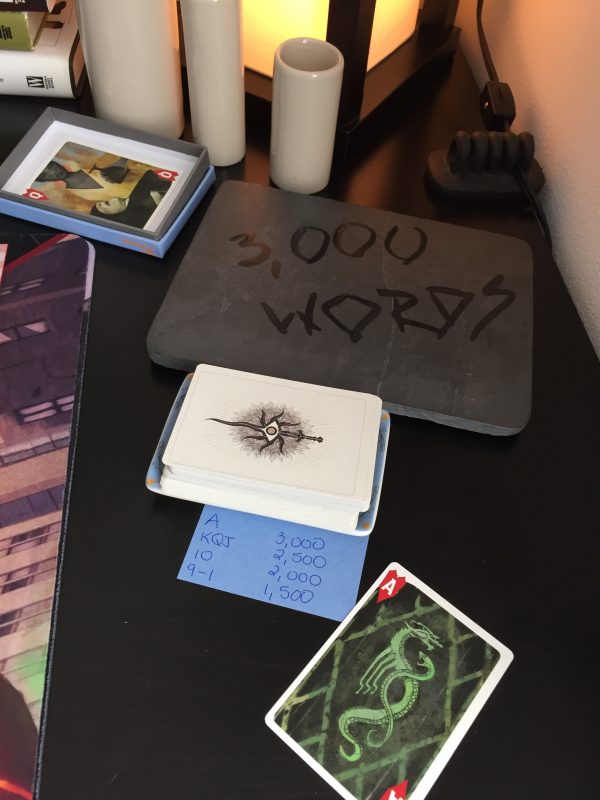I’m a poet by nature. My fellow poets and I used to play a game called, “I Can Break Your Heart in Six Lines or Less.” I once won with a five-word poem. No, I won’t tell you.
Either way, it probably won’t surprise you to hear that writing game books and novels—giant books, with five words times 1000, times 10,000, times 20,000—is something of a challenge for me. Thankfully, I like challenges. And I like big books. The truth is: whether it’s a five-word poem or a 500,000-word tome, every project gets written by putting one word after another word after another.
My typical book-writing process is that I start out strong—excited, with a clear vision, very much an “I’ve got this!” sprint. And then the middle. Oh, the middle. Disaster. I’m confused. Lost. Everything I’ve written is awful. I’m going to have to throw it all away and start over (Of course, it’s not that bad, but this is how it feels every time I’m in the middle of a book). My word count falls away to nothing while I try to figure out what I did wrong and how to fix it. And then I realize that my deadline is getting closer and closer and my 2000-words-a-day plan is now closer to 3,000…5,000…7,500 words a day, and the sprint to the finish begins.
This, I have learned, is not the ideal way for me to write. Nor is it ideal for the book. So over the years, I’ve developed various tricks to keep myself on track through the long haul.
Each book seems to require a unique trick to keep the momentum going (it’s as though once I’ve used a trick, I know the secret behind it and it no longer works on me). My first book was a NaNoWriMo book, where I had to publicly announce how many words I did (or didn’t) write every day. I’ve also used rewards (mochas, usually); anti-rewards (no, you may not play Skyrim until you finish 500 more words); and my writers’ group as motivations.
For my current book’s trick, I’m using an actual deck of cards. Here’s how it works:
Let’s say I’m aiming for 100,000 words. Partly because it’s a general fitting length for fantasy and sci-fi novels, but also because it’s a nice easy number. My average word count on a rough draft is 2,000 words per day. That means it will take me 50 days of writing to complete a (very) rough draft of the book.
There are 52 cards in a deck, plus two jokers, so that seems about perfect. For this book, I’ve decided that each card is worth a certain number of words:
A = 3,000 words
K, Q, J = 2,500 words
10 = 2,000 words
9-1 = 1,500 words
Joker = Day Off!

When added together, that total is slightly over 100,000 words. Every morning (or sometimes at night, if I want to know what my next day brings), I draw a card. And then I write the number of words that the card dictates. If a card is 9-1 (or a Joker) and I feel like I want to write more, I can put the card back in the deck and redraw. But if I draw anything above a 9, I have to run with it.
Doing this might seem silly—why not just write 2,000 words every day and be done with it—but the card deck accomplishes a couple of things that are important to keeping me motivated:
- Each day is different. That adds a sense of excitement when I draw a card. Will tomorrow be a big day, a small day, or a day off? It’s a bit like that nervous and excited feeling you get right before you roll the dice during a roleplaying game.
- I picked a deck with visuals that I really like, and that helps me feel inspired. My first card for this book was the Queen of Hearts, and that somehow set the tone for the whole book in a cool way.
- There’s something satisfactory about watching the pile of cards go down—it’s a visual reminder of the work being done, and I think that’s really important. Particularly when you’re in the doldrums of the middle.
- I have rewards tucked between the cards. In roughly each of the four quarters of the deck, I have a little “coupon” to myself for something fun. It’s a way to reward myself mid-book, when I’m feeling like the process is starting to drag.
If you like to stay motivated in a more digital manner, here are some good additional tools that I also use and recommend:
Pacemaker Planner uses your word-count goal and deadline to give you various word-per-day options. It’s free, and I highly recommend jumping in there and tooling around to see if you find it useful.
Scrivener is the software that I use to write all of my books. Not every writer loves it, but if you do like and use it, you can employ its Project Tracker option to set your deadline and word goal, and it will keep track of how many words you’re writing each day toward that goal. (It’s not free, but is available on Mac, PC, and iPad).
4thewords is a fun site that gamifies the writing process. You battle creatures by writing so many words. Some creatures are easy (250 words in 30 minutes), while others are harder (2,000 or more words across a span of hours). You get rewards and complete quests while you’re writing. (It has a free introduction, and then a small fee per month).